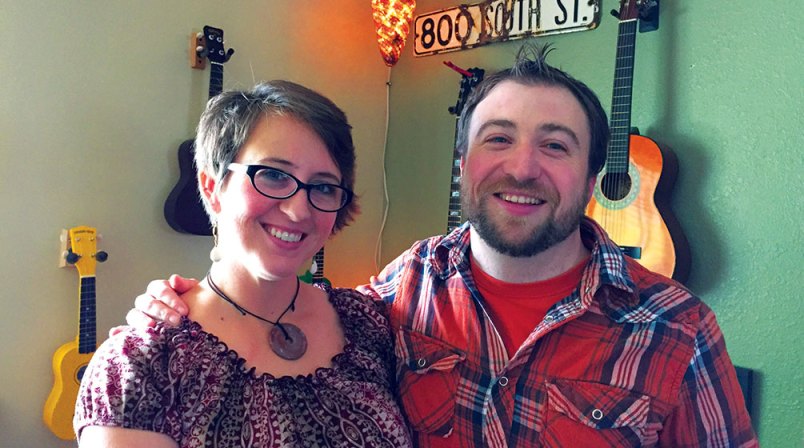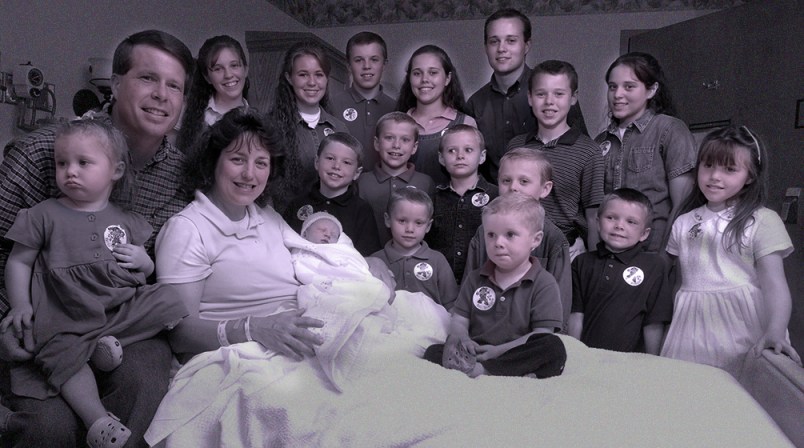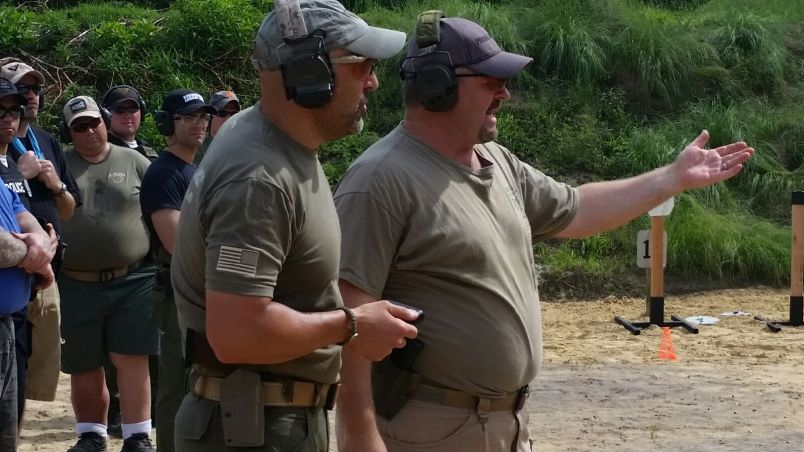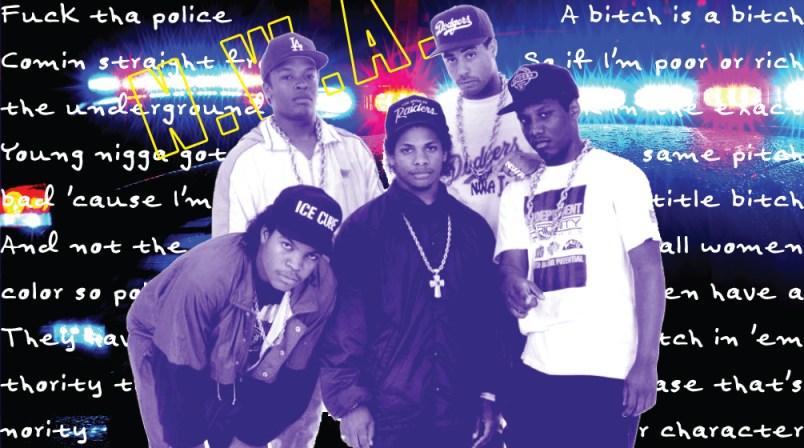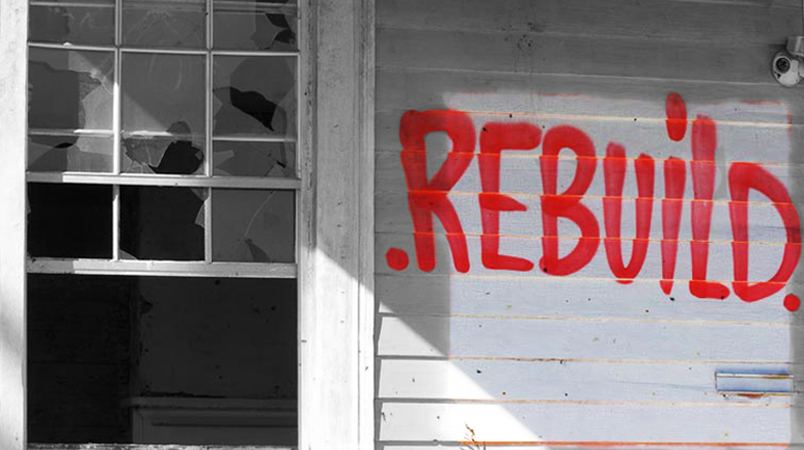We were in the basement, a shirtless Jim Morrison looming on the wall behind me, when Erin Caldwell’s naked foot snaked under her husband Danny’s leg. Her toes, one adorned with a ring, coiled around his thigh and hooked in to nest behind his knee.
Hardly a salacious gesture, not even for a conservative American family like the Caldwells. Except that Danny wants to have sex with men. “Want” isn’t the term he’d use; it’s more like his body desires it. His heart? He insists it belongs to Erin. Yet lately, “Horrible, horrible things have been said. Just a lot of stuff online,” he told me. “That our marriage is a sham. That I’m just sleeping around on the side, and that I’m not really in love with her…they’ve called her ‘a fag hag.’”
Erin flinched at those words. Fag. Hag. Two jagged syllables that seemed to gouge at her chest.
Six weeks earlier, in April of this year, the Caldwells declared their unusual marriage in the form of an amicus brief to the Supreme Court of the United States, which they cosigned with 19 other people, nearly all members of the Mormon church. Submitted in advance of the court’s oral arguments, the brief contests the constitutional legalization of gay marriage. Its signees, or amici, all hail from “mixed-orientation” marriages: same-sex-attracted men married to straight women.
At issue in the pending Supreme Court ruling is whether the 14th Amendment, ratified in 1868 to guarantee equal protections, bans states from treating gay and straight couples differently. Cautioning the justices against ruling in favor of gay marriage, the brief Danny and his wife pinned their names to states: “Rather than expand liberty, such a judgment would not only ignore the deeply fulfilling marriages between same-sex-attracted men and women and their spouses, but would also constitutionally demean such marriages and families.”
“I decided to sign it,” Danny told me, “because our marriage that we have, I do feel, is under attack.”
Danny, a therapist, and Erin, a part-time pediatric nurse, had invited me into their home in Orem, Utah one Sunday after church so I could learn more about that marriage. So I could ask the obvious questions: Why would an openly gay man marry a woman, and why would he so vociferously oppose the rights of other gay men to marry? And of course, an even more obvious question, to which Erin’s conspicuous show of affection was the perfect segue.
The basement we chatted in is a sort of rec room for the thirtysomething fans of ’60s psychedelic rock; along with The Doors, posters of the Grateful Dead and the Beatles cover the walls. Desmond, their three-year-old, takes his name from the Beatles’ “Ob-La-Di, Ob-La-Da.” They have two other sons, Jude (as in “Hey”) and Field (as in “Strawberry”).
When Desmond, still in his Sunday best—tie, white button-down, green vest—dashed into the room, I hesitated and smiled. Danny and Erin smiled back at me from the couch where they sat entwined, squeezing hands. The sex question—do they have it?—would have to wait.
That Danny feels “under attack” is hardly surprising. It’s long been the Mormon way. The church’s early history is marked by the persecution of marriage practices others found peculiar: Americans didn’t take kindly to Mormon polygamy in the 1800s. Threatened, tarred-and-feathered, and driven from state to state—their founder and prophet, Joseph Smith, shot dead—Mormons slogged across the continent until they landed in present-day Utah, where they found sanctuary, a place to marry whomever they wanted. But the sense of persecution has never left.
Because of that history, Mormons’ loud and public opposition to gay marriage has always carried with it an undeniable irony. Church elders devoted much of their recent biannual General Conference, broadcast to millions of members around the world, to emphasizing their disapproval of marriage practices they find peculiar. “The solid majority of mankind still believes that marriage should be between one man and one woman,” L. Tom Perry said from the pulpit. “We want our voice to be heard against all of the counterfeit and alternative lifestyles that try to replace the family organization that God himself established.”
This conviction has traditionally presented LGBT Mormons with a forked path: Come out of the closet and leave the church—or say nothing, deny your impulses, and marry someone of the opposite sex.
What Danny Caldwell and his fellow amici have done is something else entirely.

I was internally conflicted,” Josh Weed told me when I visited the office park outside Seattle where he has a therapy practice. When he was 18 he had a choice: Attend a Mormon school—Ricks College in Rexburg, Idaho—or “If not, then I will start pursuing relationships with men.”
The 35-year-old father of four daughters carries himself like a jovial stand-up comedian—Drew Carey, say—cracking jokes as frequently in person as he does on his blog, The Weed. His most notable physical trait is his left eye, which is legally blind and makes him look, as he once described it, “like I’m recovering from a concussion and a hangover and a bee-sting to the pupil all at once.”
He’s a colorful frontman for the Mormon mixed-orientation movement, and the closest it has to a pioneer. Weed became the subject of international fascination when he published a blog post in 2012: “Not only am I homosexual, but I’m also a devout and believing Mormon…I’m very happily married to a woman, and have been for ten years now.”
Written as an FAQ, the post revealed Weed’s coming-out story: how his father, a leader in the church, took the news of his 13-year-old son being homosexual remarkably well, and how Josh’s wife Lolly, a childhood friend, did too.
In the post, he answered the question everyone had: He has sex exclusively with his wife. The way he describes it, it’s sex not based on physical attraction but on a deep spiritual connection, unfettered by biology, and “the powerful chemicals of infatuation and obsession that usually bring a couple together.”
To be clear, Weed’s not bisexual. He’s gay. Period. But the lack of sexual attraction he has for Lolly means they must rely more heavily on communication. “This has resulted in us having a better sex life than most people I personally know,” he wrote. “Most of whom are straight. Go fig.”
Anticipating his audience’s deep skepticism—the skepticism I and nearly everyone who hears of openly gay men married to women shares—he concluded: “All of these things are true, whether your mind is allowing you to believe them or not.”
An excerpt of the piece was reposted by Gawker and read by more than 100,000 people. The couple went on ABC’s Nightline and an episode of VH1’s I’m Married to a… Now they’re in the spotlight again: Their names surfaced in the amicus brief supporting its central argument, in the form of excerpts from a video essay the Weeds recorded for LDSVoicesOfHope.org.
Get More:
I’m Married To A…, I’m Married To A…
When we spoke Weed wanted to make two things clear. One, he does not practice gay conversion or reparative therapy, as some of his critics accused after his coming-out post. (As a teenager, counselors tried to convince him that his sexual attraction to men was simply a phase; he says he would never advocate that kind of treatment.) Two, he disagrees with every single point made in the legal brief.
Unlike the Caldwells and others who signed the amicus brief, Josh and Lolly Weed do not oppose gay marriage. In their home state of Washington, in fact, they say they voted for the 2012 ballot measure that legalized it. The quotes in the brief are out of context, Weed told me. (It’s true. The Weeds’ words appear as laconic and choppy quotations, to the point of having zero impact on the argument.)
He found out about the 38-page manuscript after one of the signees—he won’t say which—gleefully emailed it to him, knowing it would upset him. Panicked, Weed emailed Darrin Johns, the lawyer who prepared the document, and asked to be removed from the brief. Weed never heard from him.

Darrin Johns denied receiving an email from Josh Weed when we spoke on the phone in early June. But he said he had every right to crib from Weeds’ public statements to support the brief’s argument. He didn’t need their endorsement, anyway. The 21 amici, all from mixed-orientation marriages, are graphic designers and chemical engineers, architects and massage therapists. Virtually all have children, all seemingly models of traditional family values.
Of all the amici I contacted, only Danny and Erin Caldwell agreed to a sit-down interview. But Troy Williams, a Salt Lake City LGBT activist, knows many of the amici and their wives. He couldn’t disagree with them more, but he understands them.
“Family is part of the cosmology of Mormonism,” Williams said, referring to the tenet of eternal progression. “[It’s] this idea that you continue to evolve. In a way you actually become like a god, have your own planets, and then populate them with your own children.” Perpetuating that family through all eternity depends upon a man being sealed in marriage to a woman in an LDS temple.
Surprisingly, he offered the amici a word of praise.
“What I like about [them] is there is an openness,” Williams explained while sipping black coffee in a Salt Lake City café. Many men in their situation stay in the closet, hide their sexuality from their spouse. But guys like Danny Caldwell “talk about it. The wives aren’t in the dark…I respect that, because there’s no deception.”
Williams wasn’t always so open himself. As a Mormon growing up in Oregon, he remembers strong same-sex urges as an adolescent. “I just believed if I went on a mission and was super-righteous that I’d be okay and it would go away eventually.”
He proselytized the Mormon gospel and papered over his sexuality with rightwing politics. As a student at BYU he interned for Gayle Ruzicka, who he calls Utah’s “grand madam of antigay politics.” Ruzicka took the closeted young Republican under her wing. They visited the state capitol together. She taught him how the legislature works.
But Williams’s sexuality kept bubbling to the surface, until he realized he could no longer deny his nature. In a prayer to his ancestors while on a tour of holy Mormon sites in the Midwest, he says he asked to be freed from his covenants. It wasn’t supernatural—he knows it was his own mind coming to terms with itself—but he felt his ancestors release him from the promises he had made to the church.
He became active in pro-LGBT politics, using Ruzicka’s political maneuvers against her. In 2014, after stints as a filmmaker and the producer and host of the public radio show Now Queer This, Williams was named executive director of Equality Utah, the leading gay rights organization in the state.
He notes that Danny Caldwell and many of the others in the brief do not refer to themselves as “gay.” They prefer the term same-sex attraction, or SSA. “To them it’s an inclination, but it’s not their identity, it’s not who they are,” unlike their religious identity, he says.
Derek Kitchen, another gay former Mormon I spoke with in Salt Lake City, who is running for city council, says this approach can’t end well. “When your entire personal worth is your standing within the church and where you land in the afterlife…It’s hard to say it’s okay to be gay.” If your strategy is to get your family and friends to accept who you are without really supporting who you are, he adds, paraphrasing gay activist and author Dan Savage, “I would not say that it gets better.”
Kitchen attracted national attention when he, his partner and two other couples sued Utah for the right to marry, leading a federal judge to overturn the state’s 10-year antigay marriage law in December 2013. Utah became the 18th state to allow same-sex marriage and a wave of federally-mandated blows against marriage bans swept the country, leading to the Supreme Court case for which Danny Caldwell and his allies signed a brief.
On May 24, Kitchen and his partner wed. If the position in the brief prevails, and the justices rule against same-sex matrimony, Kitchen’s legal marriage status could be in jeopardy.
The rift between Kitchen and Williams and the men in the amicus brief is a reminder of how easily those with nearly identical backgrounds can end up at odds with each other. Even when, like Danny Caldwell, they have similar epiphanies about their sexuality.

Danny says his homosexual urges erupted while on his mission in Amsterdam. There to convert the Dutch to Mormonism, the 19-year-old found that conversion seemed to flow both ways. “I’d see gay couples all the time,” he says, “and that really started stirring some stuff up for me.”
Overwhelmed, he confessed to his mission president. “Just pray and read your scriptures,” the leader advised. “Don’t touch any of your companions.”
Danny returned to Utah in 2003 and enrolled at Utah Valley State College in Orem. He became fast friends and then roommates with a guy he met in a rock climbing class. They did everything together (climbing, camping, church). But when the friend fell for a new employee at work—a girl—and spent more and more time with her and less and less time with his male roommate, Danny was twisted up with jealousy.
When he heard his friend had proposed to the girl, it was just like getting dumped, right down to long days of pining, alone and despondent. “What is going on with me?” he asked, sitting in his bedroom. “I’m acting like I just got broke up with. He’s still my friend. I’m going to be his best man in his wedding.”
Unable to shake the depression, he turned to the Internet, joining gay chat rooms for companionship, for answers. To get by he gorged on gay porn. When Amendment 3 appeared on the ballot in 2004—the measure that made it state law to define marriage as being between one man and one woman, the same law for which Derek Kitchen later sued the state—Danny voted against it, in favor of gay rights.
But no matter how many men he flirted with and befriended online—or the number of men (he’d lost count) he witnessed naked and intertwined on screen, their faces slack in moments of a bliss that eluded him—nothing could loosen the grip Mormonism had on him. He felt he had only two options: He could be gay or he could be a member of his church. Trapped, he decided to kill himself.
He handed his mother a note as he walked out of the house one afternoon. In it he confessed his orientation, explaining the bind he was in. “She tried calling,” he told me, “and I wouldn’t answer my phone. I had driven up the canyon. I was just sobbing.” When she finally reached him, she said everything was going to be okay.
His mother’s support pulled him from the brink, but it also reinforced his devotion to the church. He ended up not coming out but opting in—which meant finding a wife. He traded in his username on gay dating sites for one on LDSsingles.com, where he met Erin Engebretsen, a Mormon from Delaware attending nursing school in Utah County.
The two became instant friends, and talk turned to marriage in just six weeks. On a road trip Danny broke the news: I’m gay, can you accept that? Erin was almost relieved. She had a secret, too, one she thought a devout Mormon like Danny might not accept: She had had premarital sex. The two bonded through the shared revelations.
She admits now that she didn’t fully grasp what she was getting into. He confessed his obsession with gay porn, too, and at first she convinced herself that was the extent of it. “This might be TMI,” Erin told me, “but I remember making out with him and feeling stuff”—meaning an erection—“and thinking, ‘I can turn him on, so what does that mean?’ I thought it was more of a phase.”
On August 11, 2007, at the Mormon temple outside Washington, DC, Danny and Erin, sheathed in white from head to toe, knelt before an alter. In a ceremony that could only be attended by friends and family who were tithe-paying members of the church, the couple swore their devotion to their heavenly father’s gospel on Earth and to each other in an “everlasting covenant.”
Now that they were married, their church would allow them to have sex. Erin had been with a man before, and Danny had never been with anyone. Staring at naked men and getting aroused was one thing. Lying with his new wife and getting aroused, well, that was going to be quite different.

We do have sex,” Erin wanted me to know. And not just the three times their sons were conceived.
Like Josh and Lolly Weed, the Caldwells have made openness the cornerstone of their intimacy. It’s what got them over that initial hurdle on their wedding night. And it’s what fuels their frequent sex, Erin said (though she later corrected herself: “There’s definitely been times that it’s only been once every couple of months.”)
When he backslides into gay porn, Danny repents, prays, and reads the scriptures—the Bible, the Book of Mormon, and other revelations by Joseph Smith, who claimed God instructed that marriage should be between a man and several women. (Subsequent Mormon prophets claimed God later clarified that marriage on Earth should be between a man and one woman.)
“Is it hard being married to Danny?” Erin asked. “I think marriage is hard…. The pornography has been hard, but I have two choices”—divorce or push forward. “We’ve chosen to push forward.” Her parents, including her Mormon bishop father, accept her husband as the same-sex-attracted father of their grandchildren. Pretty much everyone in their lives, in fact, knows about Danny’s sexuality and all have been supportive of the marriage.
When I pressed them on why they so vehemently opposed gay marriage, Danny leaned on talking points: Constitutionally legalized gay marriage would force businesses to cater to gay couples, regardless of religious belief; private religious schools like BYU would lose tax-free status; Danny’s own marriage would feel meaningless, trampling on his constitutional rights.
Rights aren’t about feelings, I thought at that moment. They’re about people having the freedom to live the life they want. But I let it go, because this couple had invited me, however briefly, into their life—a life few understand, a life ruled by a perplexing and frustrating philosophy, a life that is ultimately what they want.
We emerged from the basement late in the afternoon. The Caldwell home smelled like potpourri. Somewhere in the house, baby Field slept. Jude watched cartoons. As I stood in the doorway, saying goodbye to the couple, Desmond, still in that green vest, ran up to me.
“Bye!” he shouted.
I held up my hand and he gave me a high-five. Then it was high-fives all around.
James Ross Gardner is the editor-in-chief of Seattle Met magazine. His writing has also appeared in Esquire, GQ, and Washingtonian.


